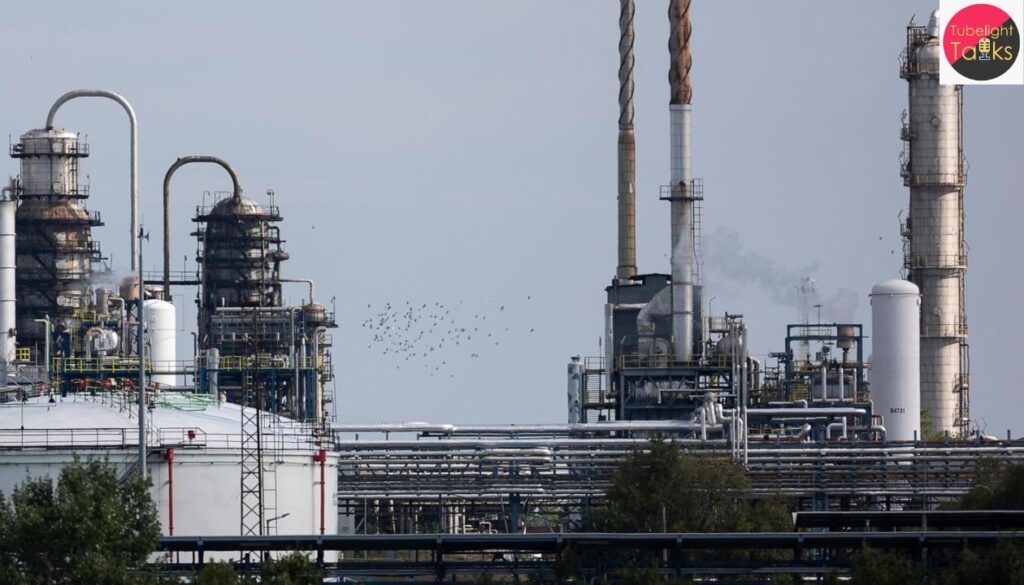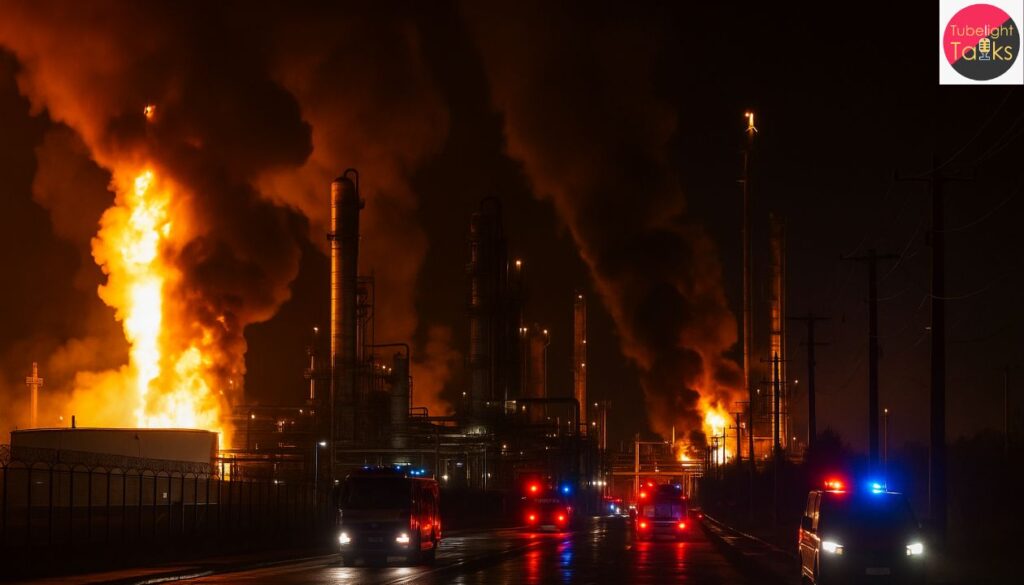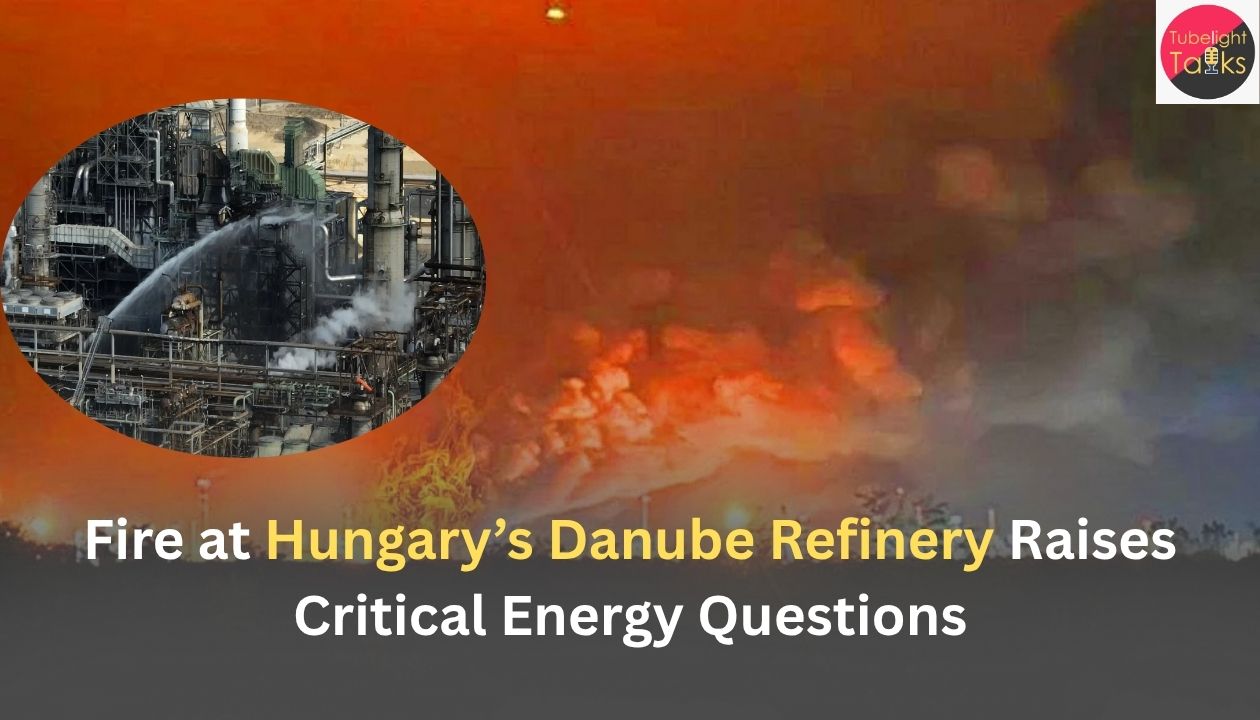Fire at Hungary’s Danube Refinery Raises Critical Energy Questions
Hungary’s Danube Refinery: Late on Monday evening in the town of Százhalombatta (≈ 27 km south of Budapest), a fire broke out at the Danube Refinery, owned by Hungarian oil‑and‑gas company MOL Group. The blaze occurred in a feed‑processing unit (AV3) and was visible from several kilometers away. By Tuesday morning, firefighters and MOL’s emergency brigade had contained the fire and begun restarting unaffected units. No injuries have been reported so far. MOL noted that the fire did not show signs of external sabotage but investigations are ongoing.
Why does the refinery matter?
Strategic refinery for Hungary & Europe
The Danube Refinery is Hungary’s only major crude‑processing facility, with a capacity of approximately 165,000 barrels per day. It primarily processes Russian crude oil supplied via the Druzhba pipeline — a rare example among EU member states given the bloc’s broader push to phase out Russian oil.

Hungary’s reliance on this single facility makes it an important node in the region’s fuel supply chain — for Bulgaria, Serbia and parts of Central Europe as well.
Impact on fuel supply & imports
Although Hungary has stated that its fuel supply remains secure, analysts warn that if major units remain offline for weeks, the country may have to draw from strategic reserves or increase imports — potentially at higher cost. The AV3 unit alone processes over 40 % of the refinery’s crude capacity.
Root causes and investigation
Technical fault vs sabotage

MOL executives stated there is no evidence of external tampering at this stage. However, Hungarian and Romanian media reported near‑simultaneous blasts at refineries tied to Russian crude, fueling speculation of possible sabotage. The cause remains under investigation; fire suppression and damage assessment are ongoing.
Also Read: California Fire Disasters
Safety protocols & restart process
MOL confirmed that emergency procedures were activated, and unaffected units are gradually restarting. The company is also reviewing whether to tap strategic crude/fuel reserves. Environmental authorities are monitoring air quality and have not detected readings above safe limits so far.
Broader implications
Energy security & dependence on Russian crude
Hungary’s case highlights how Europe continues to rely on Russian oil even as EU policy moves to end it by 2027. The incident underscores the vulnerability of such dependence.
Regional supply chains & ripple effects
A long disruption here could raise fuel prices in Central Europe, impact logistics, and force imports from less favourable sources—potentially increasing regional energy cost and geopolitical risk.
Infrastructure vulnerability
The fire exposes how even advanced refineries remain vulnerable to disruptions — whether technical or deliberate — pointing to the need for resilience, diversifying supply routes and robust safety investment.
Collective Well-being And Humility
Technology and infrastructure are vital for modern life, but their disruption reminds us of deeper truths. The teachings of Sant Rampal Ji Maharaj draw attention to the fact that true security extends beyond physical systems—it lies in service, collective well‑being and humility. In a world powered by oil, gas and pipelines, this incident invites a reflection: our strength is ultimately measured not just by how much we refine or pump, but by how responsibly we sustain, steward and share our resources.
What to watch next
Duration of shutdown & repair timeline
Analysts say if the AV3 unit remains out of action for months, Hungary may need to import fuel or draw on reserves—watch for official timelines and production guidance.
Government & MOL response
Track statements from Hungarian PM Viktor Orbán, energy ministry and MOL regarding investigations, cost of damage and compensation.
Fuel price & import data
Monitor changes in pump prices in Hungary, import statistics, strategic reserve drawdown and possible market dislocation in Central Europe.
Policy implications
Will the incident accelerate Hungary’s transition away from Russian crude? Will the EU revise its supply‑chain risk policies or energy buffer strategies?
FAQs: Hungary Danube Refinery Fire
Q1. Where did the fire occur?
At the Danube Refinery in Százhalombatta, Hungary — about 27 km south of Budapest.
Q2. Were there any injuries?
No injuries or fatalities have been reported.
Q3. What caused the fire?
The cause is under investigation. Early statements indicate no external tampering, but nearby incidents raise questions of sabotage.
Q4. Will fuel supply be affected?
Hungarian authorities and MOL say fuel supply remains secure for now, but a prolonged shutdown could force reserve draws or imports.
Q5. Why is this refinery significant?
It is Hungary’s only major crude‑processing facility, refining Russian crude supplied via the Druzhba pipeline — a unique reliance within the EU context.











Discussion (0)